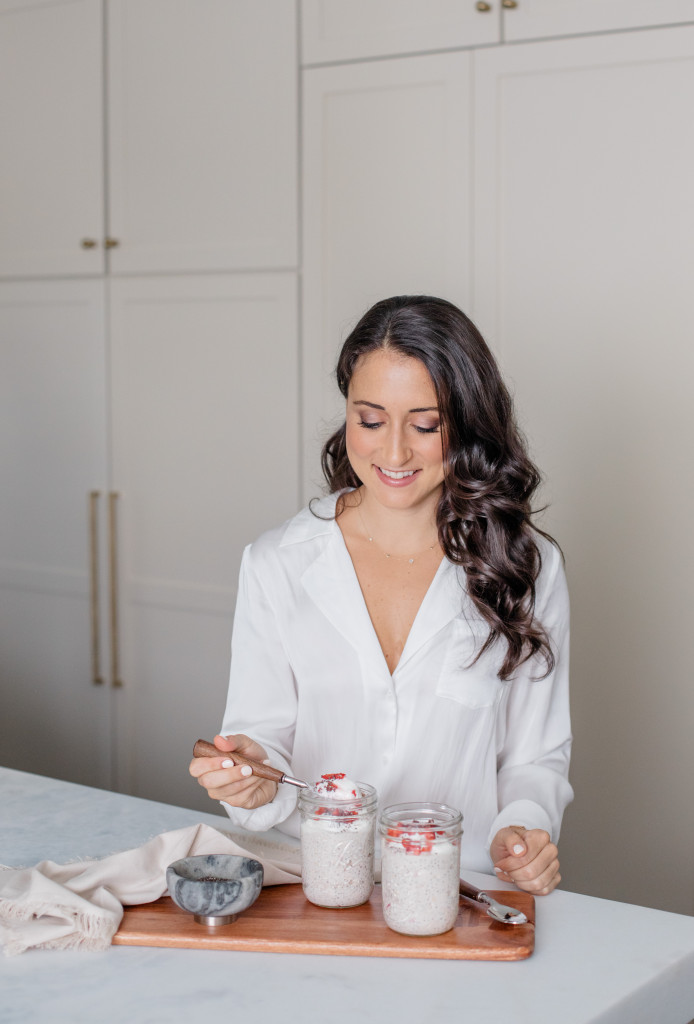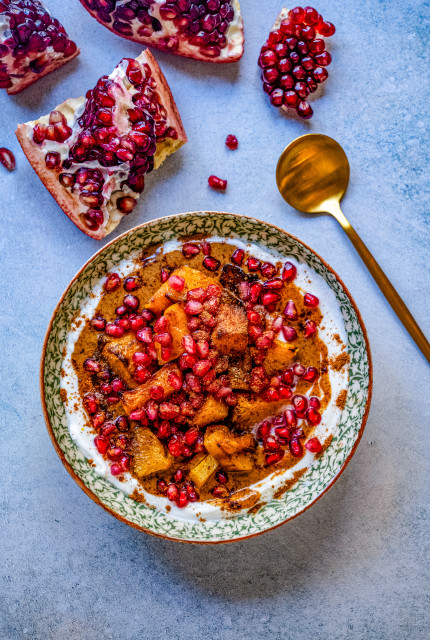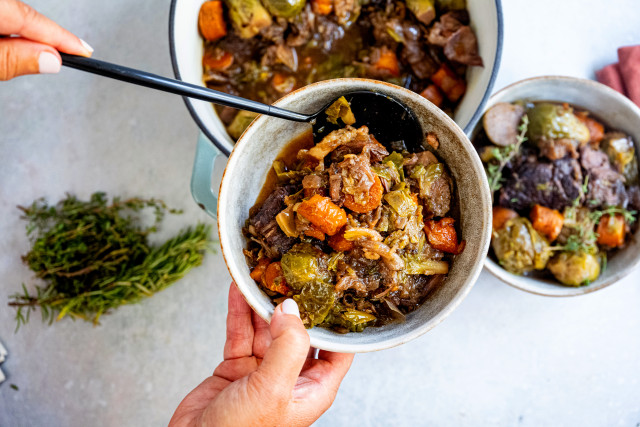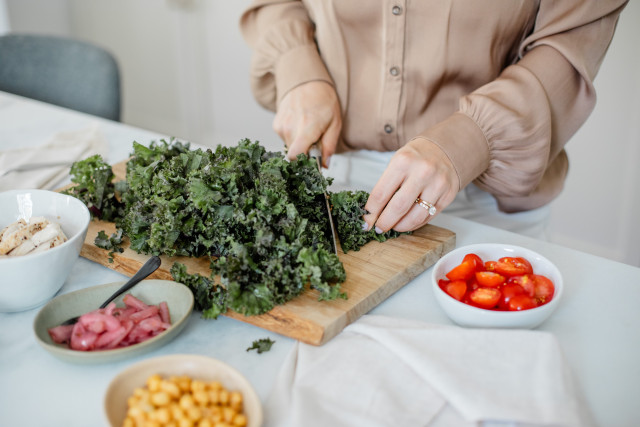
Jamie's Experience With Autoimmunity
I am no stranger to elimination diets. Having spent all of my high school years dealing with chronic stomach aches, I became a pro at tinkering with my diet to fix my ailments. So when I came across the AIP diet — easily one of the most restrictive elimination diets — I was unphased. Changing my diet was the only thing that cured my years long battle with gastrointestinal issues, so I had faith that this diet could cure the gnarly autoimmune symptoms that had been popping up for me.
In a matter of months, I went from feeling perfectly fine to dealing with extreme fatigue, painful and swollen joints, chronic hives, and one very terrifying episode of anaphylaxis towards foods that I had eaten on a regular basis. Needless to say, I was ready to try anything. If my doctor had told me I could only eat dirt for the rest of my life to get rid of the symptoms I was experiencing, I would have done it. So as according to this diet, I gave up grains, nuts, seeds, legumes, dairy, eggs, nightshades, coffee, and — the hardest of all — chocolate, and it seemed like no big deal.
The first month of the diet was no issue for me. As I mentioned, I had been feeling so awful that I had a pretty strong motivator to stick with all of the restrictions. Plus, I didn’t have the energy to go out to dinner, let alone leave my apartment most days, so I didn’t have to deal with navigating a menu while maintaining the elimination diet. However, I would be lying if I said I felt an immediate improvement. In fact, things actually felt a bit worse in the beginning — a reaction I attributed to my body getting used to the new diet. But, after those first few weeks, my symptoms began to improve. I had the energy to walk more than a few blocks, my joint swelling was going down, and my hives started to fade. I was far from feeling back to normal, but overall, it seemed like things were on the up and up.
Ironically, as things got better for me physically, mentally I was plummeting. I was ready to begin hanging out with friends again and being a normal 24-year-old girl in New York City, but my body was fighting me every step of the way. I’d go out to dinners with friends, only to panic about what I was putting in my body. Would eating a little black pepper or some seed oils send my disease roaring again? I was so afraid of going back to feeling so bad again, that I would experience what I call 'mini freak outs' every time I went out to eat. Spoiler alert: that made my symptoms worse.
Also, though the AIP diet does not allow alcohol, I somehow told myself it would be fine to drink on the weekends with friends as long as I maintained strict adherence to the diet outside of that. And this wasn’t just a glass of wine at dinner drinking. This was twenty-something living in the big city going out with friends drinking, so clearly, that was not exactly contributing to my health. I was just so desperate to be normal again, to do the things that my friends were doing, and to resume my regular life, that I made this exception. In the moments that I was going out, I could maybe get a few hours of feeling normal (that is, if the fatigue didn’t knock me over the head while I was out at the bar), but the days after, the symptoms would come roaring back and I would spend hours wallowing about how life wasn’t fair.
This cycle of being really strict with the diet (and missing out on social events because of that), having periods of “cheating” to feel normal again, and then the inevitable pain and pity party that followed characterized the next few months of my AIP experience. I couldn’t help but look around and wonder why I had to deal with all of these health issues while it seemed like everyone around me got to enjoy life symptom-free. Add to that, I was unhappy at my job and as a pretty private person, I was inadvertently pushing away my friends because I didn’t want to bother them with my issues. I don’t remember a ton from this year — I think I tried to block out a lot of the painful memories — but overall, I remember feeling lost, alone, and scared that I would never really make a recovery, that these terrible feelings would become my new normal.
Because my memory of that year is pretty hazy, I’m not sure exactly what the catalyst was that finally got me to change, though I do know it wasn’t one single thing that helped me get better. A bunch of tiny tweaks to my lifestyle and mindset made all the difference. Almost a year after I was diagnosed, I finally quit my job and decided to pursue a career that I knew would make me happy: helping others heal their chronic issues through diet. I also began nurturing my relationships more. I’ve always had incredible friends and family, so I began opening up more, being a better friend, and finding even more new friends with similar values. I really began to examine the ways that this elimination diet was serving me and the ways that it was taking away. And, finally, I began working for Brigid who gave me the last few tips to help me heal my gut rather than just focusing on all of the foods that I needed to cut out. Overall, it was a very long two years before I started to feel like my normal self again. I don’t say that to discourage anyone looking to heal from their autoimmune conditions, but rather to help you learn from my mistakes. This diet and the accompanying lifestyle changes can make a huge difference in autoimmune conditions, but there is absolutely a right and wrong way to do them, and I dabbled in just about every wrong way. See below for my biggest learnings from my AIP experience and what you can do to make this elimination diet work best for you. It’s been almost seven years since I was first diagnosed with my autoimmune issues, and I can happily report that my life is better than even before I began experiencing my symptoms. This doesn’t mean that I don’t experience flare-ups or that I am 100% symptom-free, but the work that I put in to change my diet and lifestyle have led to improvements in every area of my life. This experience forced me to put in the work to examine which areas of my life weren’t working so that I could make the changes I needed to become a better, happier, and healthier person.
My Biggest Learnings
Focus More On What You Need to Add Versus What You Need to Eliminate
While it is important to be strict about what you are eliminating while on this diet, it is equally -- if not more important -- to focus on what nutrients to add into your diet. Since I was pretty fatigued and didn’t want to waste time cooking and grocery shopping, there would be days where I would end up eating a half a cup of coconut butter and a bag of plantain chips since they were AIP approved. However, it is incredibly important to focus on getting in enough veggies, quality protein, and gut healing foods to make sure you are fueling yourself for healing.
Focus on Healing, Not Just Eliminating
Similar to the last point, it's key to work on healing your gut while eliminating foods. The current theory with autoimmune disease is that leaky gut can be a big driver of these food reactions. In leaky gut, the junctions linking the cells of your intestines together become loose, letting through large particles of food. As your body attacks these food proteins, it can become confused and attack proteins in your body tissues that look similar. While you need to eliminate these foods for some time so your body can calm down its attack, it is also crucial to heal the gut lining so that you can reintroduce these foods without having this same issue happen over and over.
Eat Enough, Especially Carbohydrates
This diet is not the time to be counting calories. While it can be very difficult to get in enough food if you’re dealing with fatigue and overall feelings of unwell, it is important to get enough nutrients in to help your body heal. Also, since the diet can be naturally lower in carbohydrates due to the grain and legume limitations, it is important to eat enough root vegetables and fruit to have adequate carbohydrates to fuel your body. When carb intake is low, cortisol – the stress hormone – production has to increase so you can create your own glucose from other forms of energy. However, chronically elevated cortisol can further excite your nervous system, impairing healing. I struggled to both eat enough in general and eat enough carbohydrates since I wasn’t focusing on fueling my body, and it definitely slowed my progress.
Focus On Your Total Lifestyle, Not Just Food
This is one of the most important tips so pay close attention. Autoimmune disease is perpetuated and sustained by so much more than just diet. It is easy to forget that simply stress and your emotional state can have such a huge effect on your disease. While the diet is an important piece of the puzzle, it is only one piece of the puzzle. Take a good look at your life as a whole — your stress, sleep quality, relationships, feelings of purpose, and your overall happiness — and see where you can make changes to best support your health and happiness. We often forget, but emotions have the capability to affect our gene expression. Any of my clients reading this will laugh because they know how much I tell them to prioritize joy. Even if you’re having a terrible flare up period, where can you add more joy to your day?
Stop Stressing About Every Morsel Of Food
Of course, you need to be strict in an elimination diet. However, there is a difference between being strict and being obsessive to the point of mental detriment. While I recommend minimizing eating out during your elimination, if you have to or if you end up eating something non-AIP approved, simply forgive yourself, take note of any symptoms, and move on. Ironically, panicking and wasting all of your mental energy thinking about what you are going to eat can increase stress that makes the disease worse.
Speaking of Stress, Understand Stress!
If you asked me at any point in my teens or twenties if I was stressed, I would have laughed at that ridiculous question. I pride myself in maintaining a cool as a cucumber attitude and unbreakable ability to take on more and more. The funny thing about stress is that it doesn’t have to feel like mental anguish. Stress can come from living a go-go-go lifestyle, never taking a deep breath, overexercising, undereating, and so much more! While gut health is one of the major contributors to autoimmune health, so is the nervous system. And the second I started caring for my nervous system, I began healing. This meant regular meditation and breathing exercises, trying alternative therapies like acupuncture and PEMF (a tool more clients than I can count call “voodoo magic”), and finally starting therapy to address the toll that growing up with chronic illness had left on me. This step truly cannot be skipped. Your nervous system is everything for healing.
Stop Chasing the Next Cure
It can be alluring to research and find the next best cure, especially when these things are fun wellness activities like saunas, massage, or delicious superfoods. And while there is benefit to all of these things and more, it is important to focus on nailing the basics first before chasing a new cure. It is tempting to believe that your healing will be found in a single supplement or morning routine, but unfortunately that’s just not the case. Nail the basics and then add in these bonuses for additional healing. The majority of the healing is already inside of you, you just need to give your body the tools to do so.
Get Out of the Victim Mindset
This one is the absolute hardest to hear when you are going through it, but it is the one that will make arguably the biggest difference. You are 100% allowed and encouraged to grieve over your situation and the life that you were used to. Let it out, feel angry and sad about it, and then recognize when these emotions no longer serve you. While it is cathartic to feel these feelings, that catharsis only lasts so long before staying in this mindset negatively affects your life. While you may not be able to control what your body does, you can control your mind and your actions, so focus on that. What helped most for me was looking at the things that I could change versus what I couldn’t. Daily, I had to remind myself not to focus on the things that I couldn’t change, like my symptoms, and focus on the things that I could affect, like my diet and my mood. For example, those days I couldn’t get out of bed? Why not make it an at home spa day! I won’t pretend there weren’t other things I wanted to do instead, but that was how I made the best of a crappy situation. Also, having a daily gratitude practice was a great way for me to shift my mindset from focusing on what my life was lacking to what was going well in my life. Again, this shift is not easy at all, but it makes all of the difference to get yourself out of the negative mindset of being the victim.
Throw Away Your Pride
I am a very type A, do it yourself, independent person. So, once I understood what was allowed on the AIP diet, I thought I could go it alone. Boy was I wrong. Working with a professional allows you to dig into the emotional barriers of the disease that you might not otherwise address working by yourself and it gives you a great accountability buddy for when things get tough. Also, a professional can walk you through how to properly reintroduce foods. This is something that I never did as I became fatigued with the diet, and ended up -- four years later -- having to redo a proper elimination diet to finally determine which foods were triggers for me. Another very important point: don’t be ashamed to take medication. There is this idea that to believe in functional nutrition you have to shun western medicine, but that is absolutely not the case. As my doctor explained to me, food can heal the disease, but medicine can make that healing even faster. In the end, the drugs that I tried were not very effective for me, but I’m glad that she pushed me to try both pharmaceuticals and lifestyle together. Use the diet to set yourself up for success and the drugs to compliment the work that the food is doing.
Listen to Your Body
I love to push myself, whether that’s in work, school, or physically. However, being this type A can cause you to ignore your body, even when it is screaming at you. I would try to crush an intense workout or go out with friends when my body was begging me to stay in and rest. And every time I ignored my body’s pleas, it would only make my symptoms that much worse. Let go of the idea that pushing yourself in the gym or at work is best for you and listen to what your body is asking for. This will majorly accelerate your healing.
I hope that my experience and subsequent learnings are helpful for you as you navigate whatever health issues you may be facing. The road to wellness is not always easy, but it’s always worth it.
*Interested in personalized nutrition support with a powerful community? Check out our signature 10-week program: My Food Is Health!


